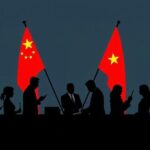UAE President’s Visit to US Highlights Growing AI Collaboration Amid China Concerns
Summary
President Joe Biden will hold discussions with UAE President Sheikh Mohamed bin Zayed Al Nahyan concerning the strengthening of ties in artificial intelligence and technology. The UAE is focusing on closing the technology gap between itself and the U.S. while managing its relationship with China, which has shown increasing interest in partnering with the UAE on tech development. Emirati officials emphasize the need for technological independence and transparency in these partnerships.
President Joe Biden is set to welcome the President of the United Arab Emirates (UAE), Sheikh Mohamed bin Zayed Al Nahyan, to the White House for discussions focused on enhancing collaboration in artificial intelligence (AI) and technology. This visit aims to solidify the UAE’s ambitious plans in AI, which have attracted interest from competing powers, particularly China. The UAE has made substantial investments in technology, including a $1.5 billion partnership with Microsoft and collaborations with chipmaker Nvidia. However, the close ties between the UAE and China have raised concerns within the United States, leading to export restrictions on certain technologies to the UAE and neighboring regions, fearing they may be shared with Chinese entities. Under pressure from the Biden administration, G42, the UAE’s state-backed tech firm, has begun to eliminate Chinese hardware and investments to strengthen ties with American companies. Anwar Gargash, the diplomatic adviser to the UAE’s president, emphasized the necessity of engaging in technological advances, stating, “We cannot let this sort of wave of technological breakthroughs pass by us and not be somehow in partnership with it.” The scheduled discussions will not only involve President Biden and Sheikh Mohamed but also Vice President Kamala Harris and various leaders from the U.S. business community. The UAE’s strategic investments in AI aim to elevate its status as a significant global economic player as demand for oil diminishes. Emirati officials are keen on developing autonomous AI technologies to avoid reliance on external entities for crucial advancements. In acknowledgment of its aspirations, Omar Sultan Al Olama, the UAE’s Minister of State for Artificial Intelligence, has expressed a commitment to aligning and engaging more closely with the United States, asserting the UAE’s strategy to achieve its technological ambitions transparently and collaboratively. Meanwhile, China continues to pursue partnerships in the UAE, evident from President Xi Jinping’s call during Sheikh Mohamed’s recent visit to Beijing for enhanced cooperation on AI. Chinese firms, including SenseTime and Terminus Group, are already making inroads into the UAE, providing further complexity to the geopolitical dynamics of technology development in the region.
This article discusses the ongoing geopolitical competition between the United States and China, particularly in the realm of technology and artificial intelligence. The UAE’s strategic investments in AI reflect its ambition to become a leader in the technology sector while navigating its relationships with both the U.S. and China. The UAE’s significant financial resources and committed government backing position it as a potential key player in the future global tech landscape, making it a focal point for both American and Chinese interests in technology development. Additionally, the concerns of the U.S. government regarding technology transfer to China underscore the complex interactions of international relations and economic partnerships. The hosting of the UAE president by the Biden administration signifies the importance of deepening U.S.-UAE ties amid rising competition with China.
In conclusion, the upcoming visit of UAE President Sheikh Mohamed bin Zayed Al Nahyan to the White House underscores the vital importance of U.S.-UAE relations in the field of technology and artificial intelligence. The UAE’s ambition to become a leader in AI, coupled with suspicions surrounding its ties with China, creates a dynamic environment for international cooperation. As the United States strives to maintain its technological edge, the strengthening of relationships with resource-rich nations like the UAE becomes increasingly crucial to counterbalance Chinese influence.
Original Source: www.usnews.com








Post Comment